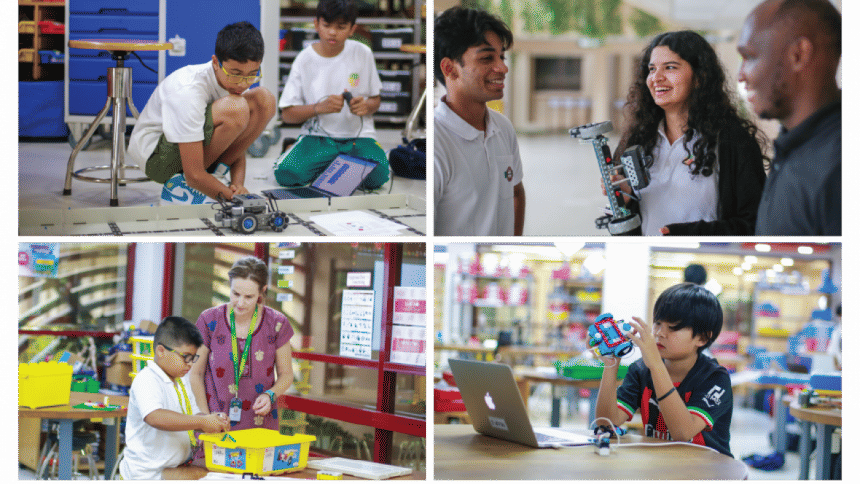Propelling tomorrow’s innovators: Carnegie Mellon’s world-leading Robotics program comes to ISD

Introducing innovative additions to its already illustrious curriculum, International School Dhaka (ISD) recently launched an ambitious new strategy – ISD 2.0. Under this initiative, ISD brought global names into the country, taking the Bangladeshi education landscape to greater heights.
The series of partnerships includes a special collaboration with Carnegie Mellon University, where young minds will be introduced to the world-renowned expertise through the leading US university's robotics program. ISD held a Carnegie Mellon Robotics Camp at the school campus, bringing exhilarating educational opportunities to enthusiastic students aged 6 to 16.
The first ever robotics-dedicated academic department in the United States was established by Carnegie Mellon University in 1979 when it introduced its Robotics Institute. Since then, it has been a world leader in computer science, robotics research and graduate education.
Held during the October break, young innovators gained hands-on experience, learning how to design, build and program their own robots. The camp was led by Carnegie Mellon-certified instructors George Carrington, Head of Design, and Claudette Muller, Primary Design teacher.
Primary school children took on the task of building a Lego Prime Robot and driving it through a well-prepared obstacle course to gather pre-arranged objects. They arranged the robot's movements using the Blockly coding library, delivering firsthand instruction in coding and computational thinking. The camp also coordinated the assembly of a VEX IQ and EXP Clawbot, a robotic arm with a claw attachment programmed to move around and interact with objects, for the more senior classes, showcasing the students' coding expertise to choreograph their robots' programmed behaviours whilst using their arms and claws for gripping and releasing objects.
While the camp focused on building and programming robots, its implications stretched far beyond. It familiarized young innovators with the intricacies of robotics assembly, using the necessary tools and techniques, emphasizing coding and computational thinking. This bolstered students' problem-solving skills, preparing them for the technology-driven future full of possibilities. The quest to overcome the challenges posed by the projects encouraged collaboration, fostering teamwork and deeper levels of critical thinking. Alongside the technical skills, the camp instilled a sense of cooperation within the participants – an attribute essential for success across all fields.
Alongside learning, the camp focused on the importance of applying the knowledge to real-world challenges while keeping up with emerging trends. While some are exploring how robotic drive trains can manoeuvre to pick up objects, others are tackling the complexities of navigating obstacle-filled courses.
To add to the excitement, ISD students in Grades 6 through 10 are preparing for a once-in-a-lifetime opportunity to compete in a robotics competition in Singapore. As they prepare to compete against teams from China, Japan, and South Korea, the students are eyeing recognition on the world stage.
ISD recognizes the paramount significance of robotics education in today's rapidly evolving world. The partnership with Carnegie Mellon University signifies a shift towards a more focused approach to robotics from the grassroots level. With automation becoming the cornerstone of the future, the school is working to prepare its students to be at the forefront of innovation and technology. This transformative experience at ISD is propelling today's young minds into a future where innovation and automation go hand in hand.
Robotics is firmly rooted throughout the curriculum, even from the youngest students where they work on activities to support the development of their computational creativity and problem-solving skills. Alongside working with robots, they have built and programmed race cars, and have designed prototype solutions for classroom issues. These activities reinforce key computational thinking practices such as experimenting and iterating, testing and debugging, reusing and remixing, abstracting and modularizing. They help students realize the value and relevance of developing these computational thinking skills in their learning and lives.
Meanwhile, the school has seamlessly integrated the Carnegie Mellon Robotics Academy skills and competencies into its Design curriculum, offering a comprehensive learning experience for older students in Grades 6-10.
The foundation of this holistic approach lies in a problem-focused and solution-oriented methodology, emphasizing the development of crucial learning skills, which feature a strong focus on using computer science, robotics and Artificial Intelligence to solve problems.
Each grade level, from 6 to 10, is immersed in unique problem-focused challenges, ranging from navigation and assistance needs to surveillance and navigating extreme environments. The hands-on experiences they gain from building and programming robots to addressing real-world challenges actively reinforce their collaboration and critical thinking skills.
Our cutting-edge Design Centre provides the perfect environment for discovery and exploration for all ages across primary and secondary schools. For more information, please visit www.isdbd.org.

 For all latest news, follow The Daily Star's Google News channel.
For all latest news, follow The Daily Star's Google News channel. 



Comments